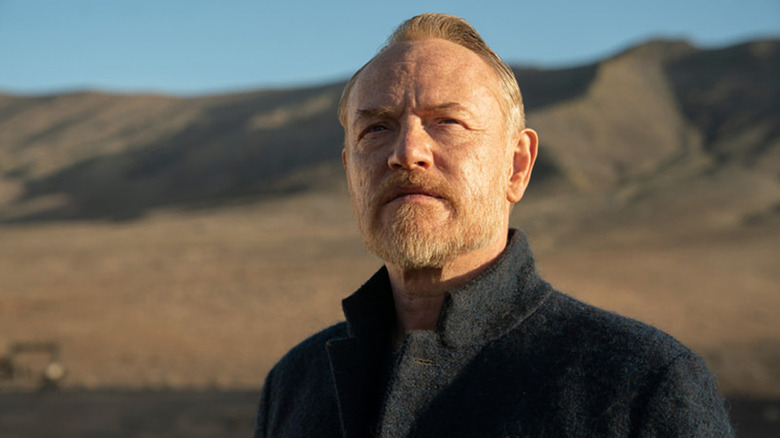David S. Goyer On The Core Rules He Set Up For Foundation (And How He Breaks Them) [Exclusive]
Despite being one of the more impressively epic shows of recent years, you might not have heard a lot about "Foundation." The Apple TV+ series didn't cause much of a stir when it debuted in 2021, and like innumerable other Apple shows, appears to have been generally overlooked — especially when compared to similarly expensive, large-scale series such as Amazon's "Rings of Power" or HBO's "House of the Dragon." But either Apple is happy to burn its embarrassing wealth or people were secretly captivated by season 1 because "Foundation" was renewed for a second season just two weeks after it debuted. And if you're showrunner and writer David S. Goyer ("Batman Begins") that's a particularly welcome development — mainly because the source material is so dense and sprawling that Goyer had to develop an eight-season plan in order to fit the whole narrative.
Based on the series of stories by Isaac Asimov, "Foundation" managed to achieve a task previously thought impossible by making the author's idea-heavy writing into a watchable show. In order to pull off such a feat, Goyer (with the blessing of the Asimov estate) chose to embellish Asimov's work with his own ideas, gender and race-swapping several main characters and imbuing the story with some good old Hollywood action and a smidge of sexiness.
And while the resulting show doesn't seem to have captivated mass culture in the way rival shows have, for the most part, Goyer's approach seems to have worked — at the very least in terms of bringing supposedly unfilmable source material to life. But there was more to it than adding explosions and making attractive characters have sex. In fact, Goyer had a (sort of) hard and fast set of rules that governed how he reimagined Asimov's universe.
'The DNA of the source material'
Speaking about "Foundation" season 1, David Goyer told /Film's Jacob Hall, "I'm not interested in traditional black and white stories. I like shades of gray." Still, when the screenwriter first sat down to develop the show, he resisted any ambiguity, creating a set of rules to guide his adaptation.
In an interview with /Film's Vanessa Armstrong, Goyer elaborated on his process, explaining how he applied his method of developing "10 commandments" to "Foundation." The writer explained how these "core tenets" are designed to get at the "DNA of the source material," and were approved by Isaac Asimov's daughter, Robyn Asimov. Goyer ran through some of these tenets and how they informed the central themes of "Foundation," saying:
"The idea that psychohistory can predict the broad movements of society and civilization, but not the individual is one. And yet, because we're all individuals, we all believe and hope that we can have agency. And so that tension between the individual taking action and knowing that they might not specifically matter in the broader sweep of history, that's something that I think is really at the heart of 'Foundation' and it's something that we explore over and over and over again."
Elsewhere, Goyer established that this psychohistory — a future form of mathematics capable of predicting the future — was able to, "predict a specific outcome," but that, "the way that we arrive there can be a surprise." That's an important concept, vocalized by Jared Harris' Hari Seldon in the early episodes of season 1 as he implores the leader of the Galactic Empire to heed his warnings of the societal collapse. Even as he announces the inevitability of collapse, he advises that the route to it can be modified so as to limit the resulting fallout.
Breaking the rules
Unsurprisingly, considering his penchant for gray areas, once David Goyer had his commandments, he also made sure to break several of them as he made his show. Specifically, Goyer revealed to /Film that he went against his rules when developing the story for "Foundation" season 2, saying:
"I love to set up rules and then say, 'How can we break them?' Or, 'How can we seem to break them?' And so psychohistory famously can't predict an individual, but I said to the writers' room in season 2, I don't think this gives too much away, that the Vault is going to name a specific person, that a specific person's name is going to be engraved upon the Vault, which seems to completely contravene the rules of how the Vault and psychohistory works.
Despite seemingly contravening his commandments, Goyer promised that the resulting story should "unfold in a very surprising way." And considering "Foundation" season 2 is set more than a century after season 1, we're expecting several surprises and unfamiliarity. The trailer for the second season also suggests Goyer and co. have doubled down on the epicness of their first season, promising to deliver a run of episodes that will hopefully manage to grab more people's attention when it debuts on July 14, 2023.


